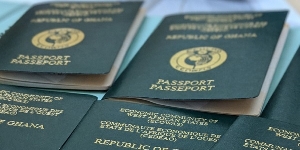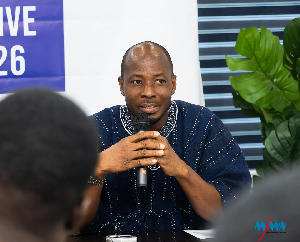over Mabey bribery scandal?
At least 5 officials of President John Atta Mills' government are set to either resign or be fired after being implicated in the ongoing bribery and corruption trial of UK bridge-building firm Mabey and Johnson, The Statesman has learnt.
The presiding judge, the Honourable Mr Justice Morrison sitting in the High Court of Justice, Queens Bench Division (UK) has issued a press gagging order barring the disclosure of the names of those implicated. But even before the ruling is made on September 25, 2009, after which the gag order will be lifted, investigations by foreign correspondents of The Statesman have revealed the names of five senior members of the Mills government allegedly caught in the web of bribe taking. One such name is health minister George Sipa-Adjah Yankey (other names will be revealed in subsequent editions).
Dr. Yankey, a former director of legal affairs at the Ministry of Finance and Economic Planning under the previous NDC administrations, was jailed together with then Finance Minister Kwame Peprah and others on 28th April, 2003 for causing financial loss to the State on a different matter.
Judge Morrison issued the gagging order in the UK to avoid influencing the outcome of other cases involving Mabey and Johnson (in Iraq). This order, however, only operates within the territorial boundaries of the United Kingdom and therefore has no effect in Ghana. Moreover, till date, no case has been filed on the matter in any Ghanaian court.
The case was brought by the UK's Serious Fraud Office and is the first case in which a British company is being prosecuted in the United Kingdom for engaging in corruption in a foreign country, and Ghana, under President Jerry John Rawlings and Vice President John Atta Mills, is one of the countries where this corruption took place.
Mabey & Johnson is accused of corruptly influencing politicians and officials in Ghana between 1994 and 1999 to land build-bridging contracts. The firm has admitted conspiring to obtain contracts by corruptly influencing Ghanaian politicians but has so far refused to name those who were influenced after a police interview. Contracts worth £22m were awarded in the 1990s for the construction of nine bridges in rural areas. The Reading based company, owned by one of Britain's richest families, had admitted on 7th July 2009 at Southwark Crown Court to paying bribes to win contracts in Ghana, Jamaica and Iraq. Evidence available to The Statesman suggests that perhaps as much as $6 million was paid as bribery money to top Ghana government officials during the two Jerry John Rawlings-headed National Democratic Congress governments (1993-2000) for the construction of bridges to facilitate transport and the carting of foodstuffs from the rural areas.
However, it has emerged that the bridges it had been paid to build in Ghana were defective. According to a high court judgment, the firm had to spend more than £2m rebuilding and repairing the bridges. The weakened bridges contained a variety of design faults after Mabey staff had made simple engineering miscalculations.
After Mabey starting its bridge building operations in Ghana, its managers found that one of its bridges with the same design had become unstable and as such partially collapsed in Ethiopia in 1996. The managers feared that its bridges in Ghana might also fall down. Three bridges were rebuilt and five others repaired. According to the charge sheet of case number 0902300773, the first badges of bribery for the first Ghana project, Priority Bridge Programme 1, were paid between 01/01/1994 and 01/01/1995, one year after the nation returned to constitutional rule under President Rawlings.
The second corruption case took place between 01/01/1995 and 01/01/1997 for the Priority Bridge Programme 2.
'Between the 1st day of January 1994 and 18th day of August 1999, [respondent] conspired with certain of its directors, executives, employees and agents to give or agree to give corrupt payments contrary to Section 1 of the Prevention of Corruption Act 1906 to Ministers, officials and other agents of the Government of Ghana as inducements to secure, or as rewards for having secured contracts from the Government of Ghana, known as "Priority Bridge Programme 1", Priority Bridge Programme 2" and "Feeder Roads Projects" for the supply of goods to the said Government of Ghana by Mabey and Johnson Limited. Contrary to Section 1 of Criminal Law Act 1977,â€the first charge reads.
Mabey and Johnson is also accused of corruptly paying €422,000 (£363,000) to Saddam Hussein's regime between May 2001 and November 2002 and is also accused of conspiring to make corrupt payments in Jamaica between 1993 and 2001. The firm Mabey has also been accused of corruption in the Philippines, Papua New Guinea, the Dominican Republic and Panama.
The bridge-building firm’s prosecution comes after years of attacks on London for its alleged hypocrisy in criticising poor countries over corruption, while failing to tackle the British companies and managers that feed it by paying bribes to win contracts. The trial is also the next such case in recent years in Europe to which President Rawlings’ name and government have been linked. Ironically, Mr Rawlings is asking for his political opponents to be prosecuted for corruption.
In 2007, his name popped up in a Norwegian court, when former top officials of cement firm, Scancem admitted in court that they paid millions of dollars of bribe money to President and Mrs Rawlings. Also in the UK last year, Private Eye magazine quoted the head of Biwater company as saying that he used to pay the school fees of Mr Rawlings' children. This happened at a time that his company was bidding for a major oil contract in Ghana. The prosecution by the Serious Fraud Office has been trumpeted by the British government, which has been under pressure to bring more corrupt exporters to book. Critics say Britain's performance has been lamentable since it promised in 1997 to stamp out the payment of bribes by British companies to foreign ministers and civil servants.
General News of Wednesday, 16 September 2009
Source: Statesman












